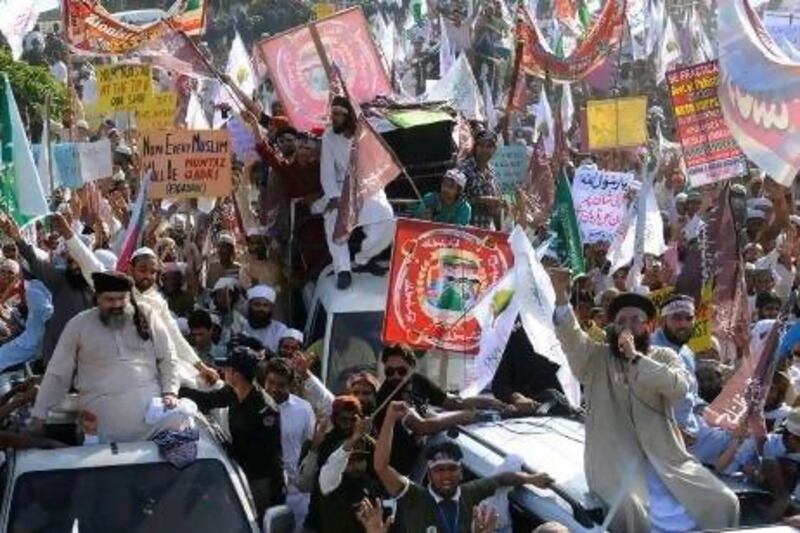ISLAMABAD // The Pakistani prime minister Raja Pervez Ashraf yesterday distanced his government from a bounty announced by one of his cabinet ministers on the head of the maker of an anti-Islam film that sparked outrage and violent protests across the Muslim world.
In an announcement on Saturday, Ghulam Ahmed Bilour, a billionaire and railways minister in Mr Ashraf's cabinet, said he would pay a bounty of US$100,000 (Dh367,000) for the death of the creator of the low-budget film made in the US.
Mr Bilour's announcement at a news conference in Peshawar came a day after violent nationwide protests against the US-made Innocence of Muslims film that left at least 21 dead in Pakistan and more than 200 injured. Karachi, the country's largest city, and Peshawar were among the worst hit when rioters ransacked cinemas, police stations and private and government buildings.
"I announce today that this blasphemer who has abused the holy prophet, if somebody will kill him, I will give that person a prize of $100,000," Mr Bilour said in Peshawar.
"I also announce that if the government hands this person over to me, my heart says I will finish him with my own hands and then they can hang me."
Mr Ashraf's aides say Mr Bilour's statements did not reflect the government's position.
"The prime minister has disassociated himself from Mr Bilour's remarks," Mr Ashraf's official spokesman, Shafqat Jalil, said.
"We have nothing to do with these remarks."
The producer of the film, Nakoula Basseley Nakoula, is reported to be a 55-year-old Egyptian Copt and convicted fraudster, based in Los Angeles and currently on parole.
Some say Mr Bilour's remarks would have little impact on country's relationship with its US ally.
"Mr Bilour is a cabinet minister and his statement has caused an embarrassment for the government as it can be used by anti-Pakistan lobbies in the West as an evidence that religious extremism is gaining strength in Pakistan," Hasan Askari Rizvi, an independent political and security analyst said.
However, he said US officials must be aware that the remarks were made against the backdrop of deep anger prevailing in Pakistan and elsewhere in the Muslim world over the film.
Mr Bilour's announcement came as a surprise for many in Pakistan as he is a senior member of Awami National Party (ANP), a secular Pashtun nationalist party which has been a staunch opponent of religious extremism.
The ANP is mainly based in Khyber Pakhtunkhuwa (KPK) province, formerly known as North-West Frontier Province.
It is made up of followers of veteran Pashtun nationalist politician, Khan Abdul Ghaffar Khan, who was renowned as "Sarhadi Gandhi" (Frontier Gandhi) for advocating the policy of non-violence of his close friend Mohandas Gandhi against British colonial rule on India.
Khan also opposed partition of India in 1947 on religious grounds.
The ANP leads the coalition government in KPK and is spearheading the campaign against Islamist militants loyal to Al Qaeda and the Taliban, which are active in the region.
Mr Bilour's younger brother, Bashir Ahmed, is a senior minister in provincial government and has survived several assassination attempts said to have been orchestrated by the Islamist militants.
The ANP also disowned the statement of senior Bilour saying he gave the remarks in his personal capacity. "These are his personal views and not of the party. We believe in non-violence," ANP spokesman Zahid Khan said.
"Just like an ordinary man, he may have become emotional on this film issue and gave this statement but this is not our official policy," he added.
However, Mr Rizvi said the railways minister might be trying to capitalise on popular sentiments for political reasons, in anticipation of general elections that are expected later this year or early next year.
The KPK is a religiously conservative region where hardline Islamic groups are very strong and where anti-US sentiments run very high because Washington's unpopular war on terrorism in neighbouring Afghanistan.
"Mr Bilour knows very well that his main rivals in elections will be the Islamic parties and he might be just wanted to win sympathies of the Islamic voters before elections," Mr Rizvi said.
"His statement seems to have more to do with domestic politics than international politics."
[ foreign.desk@thenational.ae ]
* With additional files from the Associated Press





